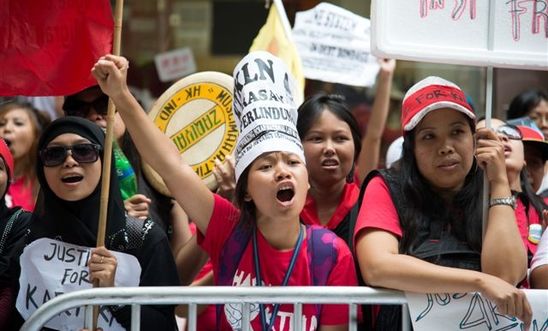
Press releases
Thousands of Indonesian women trafficked to Hong Kong face domestic slavery - new report

Thousands of Indonesian women trafficked to Hong Kong face slavery-like conditions as domestic workers, with both governments failing to protect them from widespread abuse and exploitation, Amnesty International said today as it published a new report on the issue.
The report, Exploited for Profit, Failed by Governments, exposes how Indonesian recruitment agencies and placement agents in Hong Kong, traffic Indonesian women for exploitation and forced labour. Abuses include physical and sexual violence, low pay, lack of food, and excessive and exploitative hours.
Amnesty conducted in-depth interviews with nearly one hundred women and heard horrific stories of abuse including women who were beaten by their employers, sexually abused and locked in their rooms. One woman told the researchers how her employer set her dogs on her and videod the attack.
Amnesty International Asia-Pacific Migrant Rights Researcher Norma Kang Muico said:
“From the moment the women are tricked into signing up for work in Hong Kong, they are trapped in a cycle of exploitation with cases that amount to modern-day slavery.
“It is inexcusable that the Hong Kong and Indonesian governments turn a blind eye to the trafficking of thousands of vulnerable women for forced labour. The authorities may point to a raft of national laws that supposedly protect these women but such laws are rarely enforced.
“The entire system is loaded against migrant domestic workers.
“We need to see current laws enforced and people face justice for the exploitation. Only then will we start to see an end to forced labour from Indonesia to Hong Kong.”
There are more than 300,000 migrant domestic workers in Hong Kong, with about half from Indonesia and nearly all are women. Lured with the promise of well-paid jobs the reality for the women could not be more different.
Two-thirds of migrant domestic workers interviewed by Amnesty had been subject to physical or psychological abuse. The requirement that migrant domestic workers live with their employer increases their isolation, and places them at further risk of abuse.
One woman told Amnesty how she was beaten by her employer: “He kicked me from behind and dragged me by my clothes to my room. After locking the door, he smacked and punched me. He pushed me to the ground and kicked me some more. I was black and blue all over – my face, arms and legs. My mouth and forehead were bleeding.”
Another woman recalled how “the wife physically abused me on a regular basis. Once she ordered her two dogs to bite me. I had about ten bites on my body, which broke the skin and bled. She recorded it on her mobile phone, which she constantly played back laughing.”
The exploitation the women face starts in Indonesia and then carries on into Hong Kong, with collusion between the various agencies who take advantage of them.
In Indonesia, prospective migrant domestic workers are compelled to go through government-licensed recruitment agencies including for pre-departure training. These agencies, and the brokers that act for them, routinely deceive women about salaries and fees, confiscate identity documents and other property as collateral, and charge fees in excess of those permitted by law. Full fees are imposed from the outset of training, trapping the women with crippling debt should they withdraw.
Lestari, 29, told of when she first arrived at a training centre: “I was shocked. It was surrounded by high fences and all the women had their hair cut short. I was given a piece of paper with English writing on it. All I could read was the number 27 million. The staff told me, “You have to sign this.” There were about 30 of us; we just did as we were told. Afterwards, they said “What you have signed means that if you decide to leave you have to pay us 27 million rupiah (US$ 2700).””
Women from several different training centres also reported that they were forced to have a contraception injection. Many women said the training staff frequently taunted, abused and threatened them with the cancellation of their employment application. The vast majority could not freely leave the training centres.
Once in Hong Kong, women are trapped in the often abusive situations they are placed in, the workers told Amnesty that contracts could be terminated if they complained about their treatment. Hong Kong’s laws stipulate that migrant domestic workers must find new employment and get an approved work visa within two weeks of the termination of their contract, or they must leave Hong Kong.
This pressures workers to stay in an abusive situation because they know that if they leave their job, they are unlikely to find new employment in two weeks and therefore must leave the country. For many this would make it impossible to repay the recruitment fees or support their families.
Amnesty is calling on both the Indonesian and Hong Kong governments to swiftly ratify and implement the International Labour Organisation’s Domestic Workers Convention.